Featured New Releases
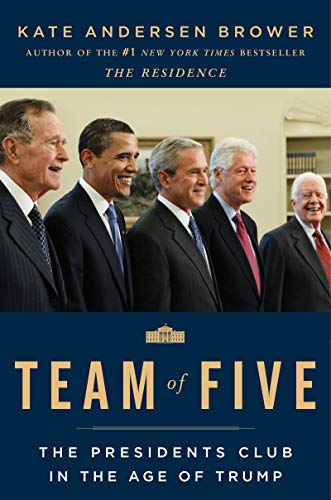
TEAM OF FIVE
by Kate Anderson Brower
From the #1 New York Times bestselling author of The Residence and First Women—also a New York Times bestseller—comes a poignant, news-making look at the lives of the five former presidents in the wake of their White House years, including the surprising friendships they have formed through shared perspective and empathy.
After serving the highest office of American government, five men—Jimmy Carter, the late George H. W. Bush, Bill Clinton, George W. Bush, and Barack Obama—became members of the world’s most exclusive fraternity. In Team of Five, Kate Andersen Brower goes beyond the White House to uncover what, exactly, comes after the presidency, offering a glimpse into the complex relationships of these five former presidents, and how each of these men views his place in a nation that has been upended by the Oval Office’s current, norm-breaking occupant, President Donald Trump.
With an empathetic yet critical eye and firsthand testimony from the Carters, Donald Trump, and the top aides, friends, and family members of the five former presidents, Team of Five takes us inside the exclusive world of these powerful men and their families, including the unlikely friendship between George W. Bush and Michelle Obama, the last private visits Bill Clinton and Barack Obama shared with George H.W. Bush, and the Obamas’ flight to Palm Springs after Donald Trump’s inauguration. Perhaps most timely, this insightful, illuminating book overflows with anecdotes about how the ex-presidents are working to combat President Trump’s attempts to undo the achievements and hard work accomplished during their own terms.
Perhaps most poignantly, Team of Five sheds light on the inherent loneliness and inevitable feelings of powerlessness and frustration that come with no longer being the most important person in the world, but a leader with only symbolic power. There are ways, though, that these men, and their wives, have become powerful political and cultural forces in American life, even as so-called “formers.”

DIRT
by Bill Buford
A hilariously self-deprecating, highly obsessive account of the author’s adventures, in the world of French haute cuisine, for anyone whose ever found joy in cooking and eating food with their family–from the author of the best-selling, widely acclaimed Heat.
A New York Times Book Review Editors’ Choice
Bill Buford turns his inimitable attention from Italian cuisine to the food of France. Baffled by the language, but convinced that he can master the art of French cooking–or at least get to the bottom of why it is so revered– he begins what becomes a five-year odyssey by shadowing the esteemed French chef Michel Richard, in Washington, D.C. But when Buford (quickly) realizes that a stage in France is necessary, he goes–this time with his wife and three-year-old twin sons in tow–to Lyon, the gastronomic capital of France. Studying at L’Institut Bocuse, cooking at the storied, Michelin-starred La Mère Brazier, enduring the endless hours and exacting rigeur of the kitchen, Buford becomes a man obsessed–with proving himself on the line, proving that he is worthy of the gastronomic secrets he’s learning, proving that French cooking actually derives from (mon dieu!) the Italian. With his signature humor, sense of adventure, and masterly ability to immerse himself–and us–in his surroundings, Bill Buford has written what is sure to be the food-lover’s book of the year.
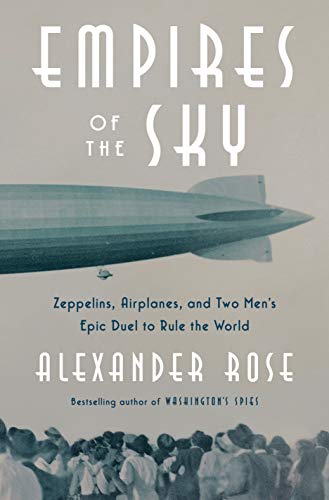
EMPIRES OF THE SKY
by Alexander Rose
The Golden Age of Aviation is brought to life by the story of the giant Zeppelin airships that once roamed the sky and ended with the fiery destruction of the Hindenburg.
At the dawn of the twentieth century, when human flight was still considered an impossibility, Germany’s Count von Zeppelin vied with the Wright Brothers to build the world’s first successful flying machine. As the Wrights labored to invent the airplane, Zeppelin fathered the wondrous airship, sparking a bitter rivalry between the two types of aircraft and their innovators that would last for decades in the quest to control one of humanity’s most inspiring achievements.
And it was the airship — not the airplane — that would lead the way. In the glittery 1920s, the count’s brilliant protégé, Hugo Eckener, achieved undreamt-of feats of daring and skill, including the extraordinary Round-the-World Voyage of the Graf Zeppelin.
At a time when America’s airplanes — rickety deathtraps held together by glue, screws, and luck — could barely make it from New York to Washington, Eckener’s airships serenely traversed oceans without a single crash, fatality, or injury. What Charles Lindbergh almost died doing — crossing the Atlantic in 1927 — Eckener effortlessly accomplished three years before the Spirit of St. Louis even took off.
Even as the Nazis sought to exploit Zeppelins for their own nefarious purposes, Eckener built his masterwork, the behemoth Hindenburg — a marvel of design and engineering. Determined to forge an airline empire under the new flagship, Eckener met his match in Juan Trippe, the ruthlessly ambitious king of Pan American Airways, who believed his fleet of next-generation planes would vanquish Eckener’s coming airship armada.
It was a fight only one man — and one technology — could win. Countering each other’s moves on the global chessboard, each seeking to wrest the advantage from his rival, the two men’s struggle for mastery of the air was not only the clash of technologies, but of business, diplomacy, politics, personalities, and their vastly different dreams of the future.
Empires of the Sky is the sweeping, untold tale of the duel that transfixed the world and helped create our modern age.

ENEMY OF ALL MANKIND
by Steven Johnson
Henry Every was the seventeenth century’s most notorious pirate. The press published wildly popular—and wildly inaccurate—reports of his nefarious adventures. The British government offered enormous bounties for his capture, alive or (preferably) dead. But Steven Johnson argues that Every’s most lasting legacy was his inadvertent triggering of a major shift in the global economy. Enemy of All Mankind focuses on one key event—the attack on an Indian treasure ship by Every and his crew—and its surprising repercussions across time and space. It’s the gripping tale one of the most lucrative crimes in history, the first international manhunt, and the trial of the seventeenth century.
Johnson uses the extraordinary story of Henry Every and his crimes to explore the emergence of the East India Company, the British Empire, and the modern global marketplace: a densely interconnected planet ruled by nations and corporations. How did this unlikely pirate and his notorious crime end up playing a key role in the birth of multinational capitalism? In the same mode as Johnson’s classic non-fiction historical thriller The Ghost Map, Enemy of All Mankind deftly traces the path from a single struck match to a global conflagration.
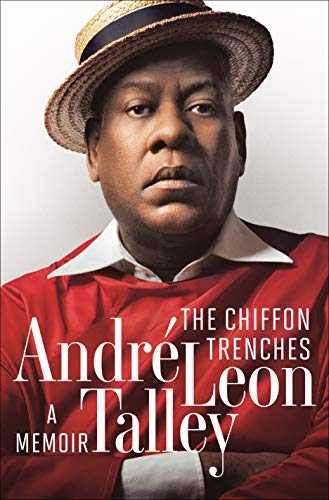
THE CHIFFON TRENCHES
by Andre Leon Talley
During André Leon Talley’s first magazine job, alongside Andy Warhol at Interview, a fateful meeting with Karl Lagerfeld began a decades-long friendship with the enigmatic, often caustic designer. Propelled into the upper echelons by his knowledge and adoration of fashion, André moved to Paris as bureau chief of John Fairchild’s Women’s Wear Daily, befriending fashion’s most important designers (Halston, Yves Saint Laurent, Oscar de la Renta). But as André made friends, he also made enemies. A racially tinged encounter with a member of the house of Yves Saint Laurent sent him back to New York and into the offices of Vogue under Grace Mirabella.
There, he eventually became creative director, developing an unlikely but intimate friendship with Anna Wintour. As she rose to the top of Vogue’s masthead, André also ascended, and soon became the most influential man in fashion.
The Chiffon Trenches offers a candid look at the who’s who of the last fifty years of fashion. At once ruthless and empathetic, this engaging memoir tells with raw honesty the story of how André not only survived the brutal style landscape but thrived—despite racism, illicit rumors, and all the other challenges of this notoriously cutthroat industry—to become one of the most renowned voices and faces in fashion.
Woven throughout the book are also André’s own personal struggles that have impacted him over the decades, along with intimate stories of those he has turned to for inspiration (Diana Vreeland, Diane von Fürstenberg, Lee Radziwill, to name a few), and of course his Southern roots and ongoing faith, which have guided him since childhood.
The result is a highly compelling read that captures the essence of a world few of us will ever have real access to, but one that we all want to know oh so much more about.
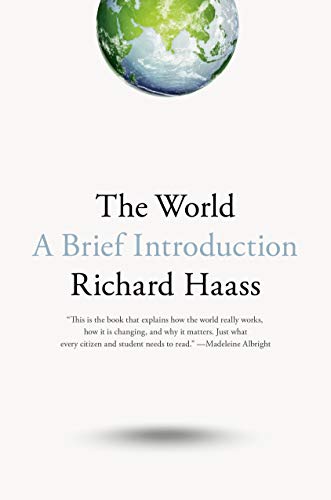
THE WORLD: A BRIEF INTRODUCTION
by Richard Haas
An invaluable primer from Richard Haass, president of the Council on Foreign Relations, that will help anyone, expert and non-expert alike, navigate a time in which many of our biggest challenges come from the world beyond our borders.
Like it or not, we live in a global era, in which what happens thousands of miles away has the ability to affect our lives. This time, it is a Coronavirus known as Covid-19, which originated in a Chinese city many had never heard of but has spread to the corners of the earth. Next time it could well be another infectious disease from somewhere else. Twenty years ago it was a group of terrorists trained in Afghanistan and armed with box-cutters who commandeered four airplanes and flew them into buildings (and in one case a field) and claimed nearly three thousand lives. Next time it could be terrorists who use a truck bomb or gain access to a weapon of mass destruction. In 2016 hackers in a nondescript office building in Russia traveled virtually in cyberspace to manipulate America’s elections. Now they have burrowed into our political life. In recent years, severe hurricanes and large fires linked to climate change have ravaged parts of the earth; in the future we can anticipate even more serious natural disasters. In 2008, it was a global financial crisis caused by mortgage-backed securities in America, but one day it could well be a financial contagion originating in Europe, Asia, or Africa. This is the new normal of the 21st century.
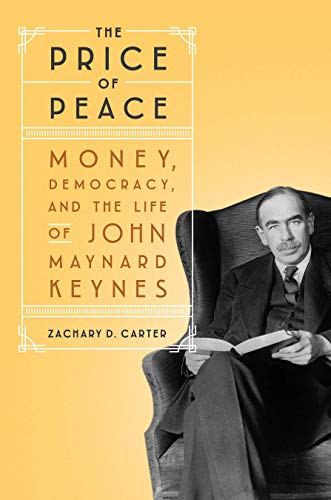
THE PRICE OF PEACE
by Zachary D. Carter
At the dawn of World War I, a young academic named John Maynard Keynes hastily folded his long legs into the sidecar of his brother-in-law’s motorcycle for an odd, frantic journey that would change the course of history. Swept away from his placid home at Cambridge University by the currents of the conflict, Keynes found himself thrust into the halls of European treasuries to arrange emergency loans and packed off to America to negotiate the terms of economic combat. The terror and anxiety unleashed by the war would transform him from a comfortable obscurity into the most influential and controversial intellectual of his day—a man whose ideas still retain the power to shock in our own time.
Keynes was not only an economist but the preeminent anti-authoritarian thinker of the twentieth century, one who devoted his life to the belief that art and ideas could conquer war and deprivation. As a moral philosopher, political theorist, and statesman, Keynes led an extraordinary life that took him from intimate turn-of-the-century parties in London’s riotous Bloomsbury art scene to the fevered negotiations in Paris that shaped the Treaty of Versailles, from stock market crashes on two continents to diplomatic breakthroughs in the mountains of New Hampshire to wartime ballet openings at London’s extravagant Covent Garden.
Along the way, Keynes reinvented Enlightenment liberalism to meet the harrowing crises of the twentieth century. In the United States, his ideas became the foundation of a burgeoning economics profession, but they also became a flash point in the broader political struggle of the Cold War, as Keynesian acolytes faced off against conservatives in an intellectual battle for the future of the country—and the world. Though many Keynesian ideas survived the struggle, much of the project to which he devoted his life was lost.
In this riveting biography, veteran journalist Zachary D. Carter unearths the lost legacy of one of history’s most fascinating minds. The Price of Peace revives a forgotten set of ideas about democracy, money, and the good life with transformative implications for today’s debates over inequality and the power politics that shape the global order.
